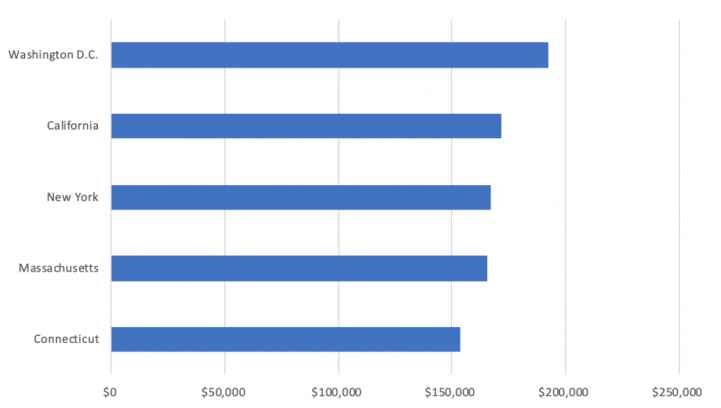The role of a U.S. Attorney is one of the most prestigious positions within the legal profession in the United States. As the chief federal prosecutor for their respective judicial districts, U.S. Attorneys are responsible for enforcing federal laws, prosecuting criminal cases, and representing the United States in civil matters. Naturally, a position of such responsibility comes with questions about compensation.
This article explores the salary of U.S. Attorneys, factors influencing their pay, and how it compares to other legal roles.
What Is the Salary of a U.S. Attorney?
As of 2024, the salary for U.S. Attorneys is set by the federal government. They fall under the Executive Schedule (EX), a system that determines the salaries of top-level federal officials.
- Base Salary:
- U.S. Attorneys typically earn $172,100 to $183,500 per year, depending on their experience and the district they serve.
- This salary is in line with Executive Schedule Level IV or III, which is used for senior federal positions.
Factors Influencing U.S. Attorney Salaries
Several factors determine the exact salary of a U.S. Attorney:
- Executive Schedule Level
- U.S. Attorneys are categorized under different levels of the Executive Schedule based on their seniority and jurisdiction.
- District Size and Complexity
- While the salary structure is generally uniform, attorneys in high-profile districts like the Southern District of New York often handle more complex cases.
- Government Adjustments
- Salaries for federal employees, including U.S. Attorneys, are subject to cost-of-living adjustments (COLA) determined by Congress.
- Years of Service
- Although U.S. Attorneys are appointed, their previous federal service (if applicable) can influence their pay.
How Do U.S. Attorney Salaries Compare to Other Federal Positions?
Here’s how U.S. Attorney salaries compare to other top federal roles:
- U.S. District Judges:
- Earn approximately $232,600 annually, higher than U.S. Attorneys due to their lifetime appointments and responsibilities.
- Assistant U.S. Attorneys (AUSAs):
- Assistant U.S. Attorneys, who work under the U.S. Attorneys, earn between $64,000 and $173,000, depending on experience and location.
- Private Sector Attorneys:
- Attorneys in private practice, especially those at large firms, often earn significantly more, with salaries starting at $200,000 to $300,000 for senior associates or partners.
- Other Federal Officials:
- Members of Congress earn $174,000 annually, comparable to U.S. Attorneys.
Benefits and Perks of Being a U.S. Attorney
In addition to their salary, U.S. Attorneys receive a range of benefits:
- Health and Retirement Benefits
- Comprehensive health insurance and access to federal retirement plans, including the Federal Employees Retirement System (FERS).
- Job Security
- While U.S. Attorneys serve at the pleasure of the President, their tenure is typically stable during an administration.
- Professional Prestige
- The position provides a strong foundation for future roles, including judicial appointments or private sector opportunities.
- Work-Life Balance
- Federal holidays, paid leave, and flexible working arrangements enhance the overall compensation package.
Challenges That Come with the Role
The salary of a U.S. Attorney, while generous by public sector standards, comes with its challenges:
- Heavy Workload
- U.S. Attorneys oversee complex and high-profile cases, requiring long hours and significant mental stamina.
- Public Scrutiny
- As federal prosecutors, their decisions often face public and political scrutiny.
- Limited Earnings Compared to Private Sector
- Despite their high level of expertise, U.S. Attorneys earn less than many private sector attorneys, especially those at top law firms.
How Are U.S. Attorneys Appointed?
Understanding the appointment process provides context to their compensation:
- Presidential Nomination:
- U.S. Attorneys are appointed by the President and confirmed by the Senate.
- Term Length:
- They typically serve at the pleasure of the President, meaning their tenure aligns with the administration unless replaced.
- Merit-Based Selection:
- Candidates are often selected based on their legal expertise, leadership, and experience in federal prosecution or litigation.
Why Is the Salary Justified?
Given the nature of their work, the salary of a U.S. Attorney reflects their:
- Legal Expertise:
- U.S. Attorneys are among the most skilled lawyers, often with decades of experience in litigation and prosecution.
- Responsibility for Federal Law Enforcement:
- They manage federal cases involving terrorism, organized crime, financial fraud, and civil rights violations.
- Public Service:
- Their role ensures justice is served, making them an essential part of the federal judiciary system.
How to Pursue a Career as a U.S. Attorney
Aspiring to become a U.S. Attorney involves a rigorous legal and professional journey:
- Educational Background:
- Obtain a law degree from an accredited institution.
- Federal Experience:
- Gain experience as an Assistant U.S. Attorney (AUSA) or in another federal legal role.
- Reputation and Networking:
- Build a strong reputation for legal expertise and integrity.
- Nomination and Confirmation:
- Secure a nomination from the President and navigate the Senate confirmation process.
Future of U.S. Attorney Salaries
The salaries of U.S. Attorneys are likely to evolve with:
- Inflation Adjustments:
- Regular reviews ensure that federal salaries keep pace with economic changes.
- Increased Workload:
- As federal cases become more complex, salary structures may reflect the growing demands of the role.
- Comparative Analysis:
- Efforts to make federal legal roles competitive with private sector salaries could influence pay.

